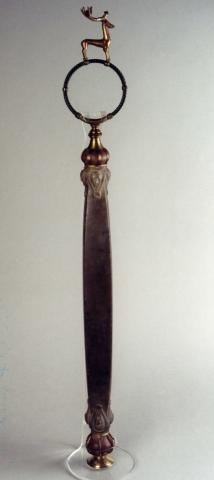< Vt Paulīnus in prōvinciā Lindisssī praedicāverit, et dē quālitāte rēgnī Eduīnī >
[1] Praedicābat autem Paulīnus verbum etiam prōvinciae Lindissī, quae est prīma ad merīdiānam Humbrae flūminis rīpam, pertingēns usque ad mare, praefectumque Lindocolinae cīvitātis, cui nōmen erat Blaecca, prīmum cum domū suā convertit ad Dominum. [2] In quā vidēlicet cīvitāte et ecclēsiam operis ēgregiī dē lapide fēcit, cuius tēctō vel longā incūriā vel hostīlī manū dēiectō, parietēs hāctenus stāre videntur, et omnibus annīs aliqua sānitātum mīrācula in eōdem locō solent ad ūtilitātem eōrum quī fidēliter quaerunt ostendī. [3] In quā ecclēsiā Paulīnus, trānseunte ad Christum Iūstō, Honōrium prō eō cōnsecrāvit episcopum, ut in sequentibus suō locō dīcēmus.
[4] Dē huius fide prōvinciae nārrāvit mihi presbyter et abbās quīdam vir vērācissimus dē monastēriō Peartaneu, vocābulō Dēdā, retulisse sibi quendam seniōrem, baptīzātum sē fuisse diē mediā ā Paulīnō episcopō, praesente rēge Eduīnō, et multam populī turbam, in fluviō Treenta iuxtā cīvitātem quae linguā Anglōrum Tiovulfingacӕstir vocātur; quī etiam effigiem eiusdem Paulīnī referre esset solitus, quod esset vir longae statūrae, paululum incurvus, nigrō capillō, faciē macilentā, nāsō aduncō pertenuī, venerābilis simul et terribilis aspectū. [5] Habuit autem sēcum in ministeriō et Iācōbum diāconum, virum utique industrium ac nōbilem in Christō et in ecclēsiā, quī ad nostra usque tempora permānsit.
[6] Tanta autem eō tempore pāx in Brittaniā, quāquāversum imperium rēgis Eduīnī pervēnerat, fuisse perhibētur ut, sīcut usque hodiē in prōverbiō dīcitur, etiam sī mulier ūna cum recēns nātō parvulō vellet tōtam perambulāre īnsulam ā marī ad mare, nūllō sē lēdente valēret. [7] Tantum rēx īdem ūtilitātī suae gentis cōnsuluit, ut plērīsque in locīs, ubi fontēs lūcidōs iuxtā pūplicōs viārum trānsitūs cōnspexit, ibi ob refrīgerium viantium ērēctīs stīpitibus aereōs caucōs suspendī iubēret, neque hōs quisquam, nisi ad ūsum necessārium, contingere prae magnitūdine vel timōris eius audēret, vel amōris vellet. [8] Tantum vērō in rēgnō excellentiae habuit, ut nōn sōlum in pugnā ante illum vēxilla gestārentur, sed et tempore pācis equitantem inter cīvitātēs sīve vīllās aut prōvinciās suās cum ministrīs, semper antecēdere signifer cōnsuēsset, necnōn et incēdente illō ubilibet per platēās illud genus vēxillī, quod Rōmānī tufam, Anglī appellant thuuf, ante eum ferrī solēbat.
notes
vocabulary
NOTE: Lemmatization of Anglo-Saxon Names
—: declined forms unattested
[ ]: nominative forms unattested (back-formed for purposes of lemmatization)
*: form unattested but hypothesized based on existing patterns
praedicō –āre –āvī –ātum: to preach
Paulīnus –ī m.: Paulinus, Bishop of York, 625-633; bishop of Rochester, 633-644
Lindissi: Lindsey
merīdiānus –a –um: southern
Humbra –ae f.: the Humber
pertingō –tingere: arrive at, extend to, reach
praefectus praefectī m.: prefect
Lindocolina (Lindocolinum) : the Roman Colonia of Lindum, modern Lincoln
Blaecca — m.: Blæcca, Praefectus of Lincoln
dominus dominī m.: lord; Lord (of Jesus Christ)
vidēlicet: clearly
ecclēsia –ae f.: church
incūria –ae f.: negligence
hostīlis hostīlis hostīle: hostile
dēiciō dēicere dēiēci deīctum: to throw down, eject
pariēs parietis m.: wall
hāctenus: thus far, so far, of space and time
sānitās –ātis f.: health
mīrāculum –ī n.: miracle
ūtilitās ūtilitātis f.: usefulness
ecclēsia –ae f.: church
Paulīnus –ī m.: Paulinus, Bishop of York, 625-633; bishop of Rochester, 633-644
Christus –ī m.: Christ
Honōrius –ī m.: Honorius, Archbishop of Canterbury, 627x631-653
cōnsecrō cōnsecrāre cōnsecrāvī cōnsecrātus: to consecrate
episcopus –ī m.: bishop
presbyter –erī m.: a priest
abba (indecl.): father
vērāx –ācis : speaking truly, true, veracious; adv. vērāciter, truthfully.
monastērium –ī n.: a monastery
Peartaneu: Partney, near Spilsby, Lincolnshire
vocābulum –ī n.: a designation, name
Deda — m.: Deda, Abbot of Partney
senex senis: old, aged
baptīzo –āre –āvī –ātum: to baptize
Paulīnus –ī m.: Paulinus, Bishop of York, 625-633; bishop of Rochester, 633-644
episcopus –ī m.: bishop
Aeduini –ī m.: Edwin, King of the Northumbrians, 616-633
fluvius fluvi(ī) m.: river
Treenta: the river Trent
iūxtā: according to
Anglī –ōrum m.: the Angles, a Germanic tribe; the English
Tiouulfingacaestir: Littleborough?, Nottinghamshire
effigiēs –ēī f.: something molded or fashioned; a figure
Paulīnus –ī m.: Paulinus, Bishop of York, 625-633; bishop of Rochester, 633-644
statūra –ae f.: height, stature
paululum: a little
incurvus –a –um: bent, curved
capillus capillī m.: hair
macilentus –a –um: thin
nāsus nāsī m.: nose
aduncus –a –um : hooked, bent
pertenuis m,f pertenue n.: very thin
venerābilis –e: venerable, deserving of respect
terribilis terribile: terrifying
aspectus aspectūs m.: sight
ministerium –ī n.: service, ministry
Iācōbus –ī m.: James, the Deacon
diāconus –ī m.: deacon
utīque: certainly
industrius –a –um: industrious
Christus –ī m.: Christ
ecclēsia –ae f.: church
permaneō permanēre permānsī permānsum: to remain
Britannia –ae f.: Britain
quaquaversum: wherever
Aeduini –ī m.: Edwin, King of the Northumbrians, 616-633
perhibeō –ēre –uī –itus: to hold persistently; maintain
prōverbium –ī n.: a proverb
nātus –a –um: born
parvulus –a –um: very small
perambulō perambulāre perambulāvī perambulātus: to go through
ūtilitās ūtilitātis f.: usefulness
plērus –a –um: very many
lūcidus –a –um: bright, shining
iūxtā: according to
cōnspiciō cōnspicere cōnspexī cōnspectus: to catch sight of, behold
refrīgerium –ī n.: refreshment, cooling
viō –āre –āvī –ātus : to travel
ērigō ērigere ērēxī ērēctus: to set up, erect
stīpes –itis m.: log or post
aereus –a –um: made of copper or bronze
caucus –ī m. : drinking vessel
suspendō suspendere suspendī suspēnsum: to hang
necessārius –a –um: necessary, essential
prae: before (+ abl.)
excellentia –ae f.: excellence
vexillum –ī n.: a military ensign, standard
gestō gestāre gestāvī gestātus: to carry, bear
equitō equitāre equitāvī equitātus: to be a horseman; to ride
vīlla vīllae f.: estate
minister ministrī m.: attendant, servant
antecēdō –cēdere –cessī –cessum: to go before
signifer –ferī m.: a standard–bearer
cōnsuēscō cōnsuescere cōnsuēvī cōnsuētus: to accustom
incēdō incēdere incessī incessus: to go, happen
ubilibet: anywhere; in any place
platēa –ae f.: street
vexillum –ī n.: a military ensign, standard
Rōmānus –a –um: Roman
tūfa –ae f.: a kind of military standard
Anglī –ōrum m.: the Angles, a Germanic tribe; the English
thuuf (Old English): a kind of military standard, cp. Latin tufa –ae f.
Aeduini –ī m.: Edwin, King of the Northumbrians, 616-633

